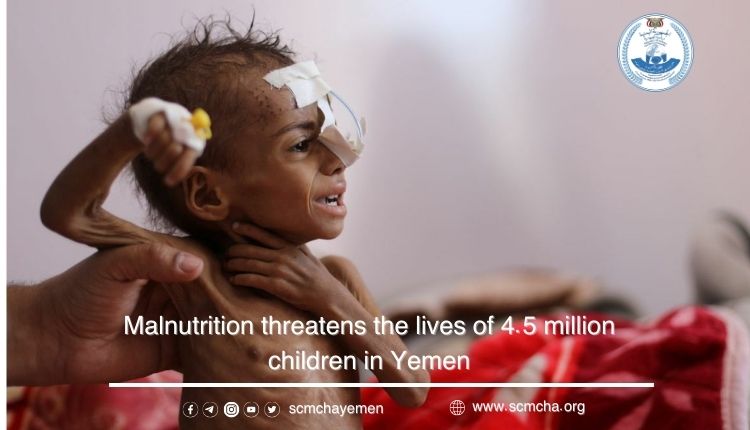Malnutrition threatens the lives of 4.5 million children in Yemen
Malnutrition places Yemeni children in the midst of the world’s worst human suffering as a result of hostility and the siege between life and death.
For more than eight years, children in Yemen have been bearing the brunt of the blockade, which has resulted in food insecurity, a collapsing health care system, and ongoing reductions in aid, not to mention the discontinuation of malnutrition prevention efforts.
Malnutrition has become an actual danger to children, who are currently facing the world’s worst human suffering as a result of aggression, blockade, continuous reductions of aid, and the suspension of malnutrition preventive initiatives.
A report issued by SCMCHA indicates that 4 million 521 thousand and 727 children and women in Yemen suffer from acute, general and severe malnutrition, including 313,790 children under five who suffer from severe acute malnutrition, while 1 million 777 thousand and 423 children suffer from General malnutrition, and one million 463 thousand and 633 children suffer from severe acute malnutrition, while 966 thousand and 881 pregnant and breastfeeding women struggle from malnutrition in order to survive in light of the humanitarian disaster caused by the aggression.
According to report, the most major root causes of acute malnutrition are violence, blockade, continuous reductions of aid, and the termination of malnutrition preventive programs and treatments.
Nearly 2.2 million children under the age of five need treatment for acute malnutrition.
More than 8.5 million children are in need of humanitarian assistance and face the daily threat of food shortages and displacement, continued reductions of aid, and the cessation of malnutrition prevention programs and interventions.
Yemen is still witnessing the world’s worst humanitarian crisis.
More than 24 million people, nearly 80% of the population, require a kind of humanitarian aid.
The number of individuals suffering from food insecurity and malnutrition is anticipated to grow much more.


